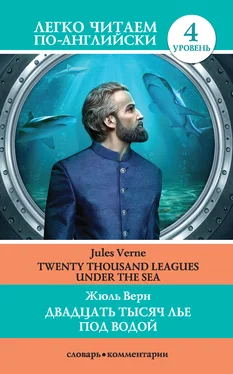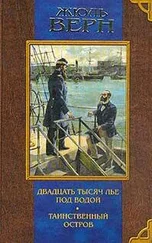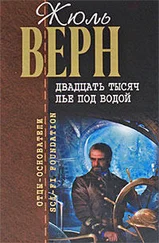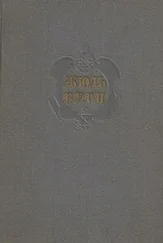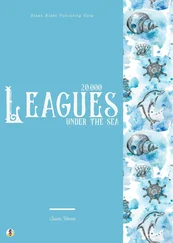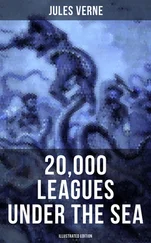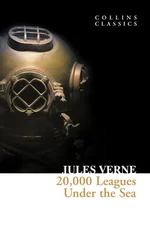A door opened, and two men appeared. One was short and stocky, powerfully muscled, broad shouldered, robust of limbs, the hair black and luxuriant, the mustache heavy, the eyes bright and penetrating.
The second stranger was a man of great pride, his calm, firm gaze seemed to reflect thinking on an elevated plane. Whether this individual was thirty-five or fifty years of age, I could not precisely state. He was tall, his forehead broad, his nose straight, his mouth clearly etched, his teeth magnificent, his hands refined. One unusual detail: his eyes were spaced a little far from each other and could instantly take in nearly a quarter of the horizon.
Wearing caps made of sea-otter fur, and shod in sealskin fishing boots, these two strangers were dressed in clothing made from some unique fabric that allowed great freedom of movement.
The taller of the two—apparently the leader on board—examined us with the greatest care but without pronouncing a word. Then, turning to his companion, he conversed with him in a language I didn’t recognize. It was a sonorous, harmonious, flexible dialect.
The other replied with a shake of the head and added two or three incomprehensible words. Then he looked at me.
I replied in clear French that I wasn’t familiar with his language; but he didn’t seem to understand me.
“Still, master should tell our story,” Conseil said to me. “Perhaps these gentlemen will grasp a few words of it!”
I tried again, telling the tale of our adventures, clearly articulating my every syllable, and not leaving out a single detail. I stated our names and titles; then, in order, I introduced myself, Professor Aronnax, my servant Conseil, and Mr. Ned Land, harpooner.
The man with calm, gentle eyes listened to me serenely, even courteously, and paid remarkable attention. But nothing indicated that he understood my story. When I finished, he didn’t pronounce a single word.
One resource still left was to speak English. Perhaps they would be familiar with this nearly universal language.
“Come on, it’s your turn,” I told the harpooner. “Mr. Land. Try for a more favorable result than mine.”
Ned started our story all over again. Its content was the same, but the form differed. Carried away by his volatile temperament, the Canadian complained vehemently about being imprisoned in defiance of his civil rights. And he added that we were dying of hunger. This was perfectly true, but we had nearly forgotten the fact.
Our visitors didn’t not say a word. I no longer knew what tactic to pursue, when Conseil told me:
“If master will authorize me, I’ll tell the whole business in German.”
“What! You know German?” I exclaimed.
“Like most Flemish people, with all due respect to master.”
And Conseil, in his serene voice, described for the third time our story. But despite our narrator’s fine accent, the German language met with no success.
Finally, as a last resort, I tried to narrate our adventures in Latin. With the same negative result.
The two strangers exchanged a few words in their incomprehensible language and withdrew. The door closed again.
“This is outrageous!” Ned Land shouted. “We speak French, English, German, and Latin to theserogues, and neither of them has the decency to even answer back!”
“Calm down, Ned,” I told the seething harpooner. “Anger won’t get us anywhere. We mustn’t despair. Let us wait a bit before we form our views on the commander and crew of this boat.”
“My views are fully formed,” Ned Land shot back. “They’re rogues!”
“Oh good! And from what country?”
“Roguedom!”
“My gallant Ned, that country isn’t clearly marked on maps of the world. What is the nationality of these two strangers? Neither English, French, nor German, that’s all we can say. But there must be southern blood in them. Probably they’re Spaniards, Turks, Arabs, or East Indians. And as for their speech, it’s incomprehensible.”
The door opened. A steward entered. He brought us some clothes, jackets and sailor’s pants, made out of a fabric whose nature I didn’t recognize. We hurried to change into them.
Meanwhile our silent steward, perhaps a deaf-mute, set the table and laid three place settings.
Overlaid with silver dish covers, various platters had been neatly positioned on the table cloth, and we sat down to eat. Assuredly, we were dealing with civilized people. The water was fresh and clear. Among the foods we were served, I was able to identify various fish. As for the tableware, it was elegant and in perfect taste. Each utensil, spoon, fork, knife, and plate, bore on its reverse a letter encircled by a Latin motto:
Mobilis in mobili [23] Mobilis in mobili – Подвижный в подвижном
N
Moving within the moving element! It was a highly appropriate motto for this underwater machine. The letter N was no doubt the initial of the name of that mystifying individual in command beneath the seas!
Our appetites appeased, we felt an urgent need for sleep. A natural reaction after that interminable night of fighting for our lives.
My two companions lay down on the cabin’s carpeting and were soon deep in slumber.
As for me, too many thoughts had piled up in my mind, too many insoluble questions had arisen, too many images were keeping my eyelids open! Where were we? What strange power was carrying us along? Then my mind grew calmer, my imagination melted into hazy drowsiness, and I soon fell into an uneasy slumber.
I had gotten up from my passably hard mattress when I felt my mind clear. So I began a careful reexamination of our cell.
Nothing had changed in its interior arrangements. The prison was still a prison and its prisoners still prisoners. But the steward had cleared the table. Consequently, nothing indicated any forthcoming improvement in our situation, and I seriously wondered if we were doomed to spend the rest of our lives in this cage.
It was becoming hard for me to breathe. The heavy air was no longer sufficient for my lungs. Although our cell was large, we obviously had used up most of the oxygen it contained.
So it was now urgent to renew the air in our prison, and no doubt the air in this whole underwater boat as well.
How did the commander of this aquatic residence get fresh air? Did he obtain air using chemical methods, releasing the oxygen contained in potassium chlorate by heating it? If so, he would have to keep up some kind of relationship with the shore.
Suddenly I was refreshed by a current of clean air, scented with a salty aroma. It had to be a sea breeze, life-giving and charged with iodine! I opened my mouth wide. This boat, this sheet-iron monster, had obviously just risen to the surface of the ocean. So the ship’s mode of ventilation was finally established.
Ned and Conseil woke up almost simultaneously, under the influence of this reviving air purification. They rubbed their eyes, stretched their arms, and sprang to their feet.
“Did master sleep well?” Conseil asked me.
“Extremely well, my gallant lad,” I replied. “And how about you, Mr. Ned Land?”
“Like a log, professor. But it seems like I’m breathing a sea breeze!”
A seaman couldn’t be wrong on this topic, and I told the Canadian what had gone on while he slept.
“Good!” he said. “That explains perfectly everything. But I’ve no idea what time it is, Professor Aronnax, maybe it’s dinnertime?”
“Dinnertime, my fine harpooner? I’d say at least breakfast time, because we’ve certainly woken up to a new day.”
“Which indicates,” Conseil replied, “that we’ve spent twenty-four hours in slumber.”
Читать дальше
